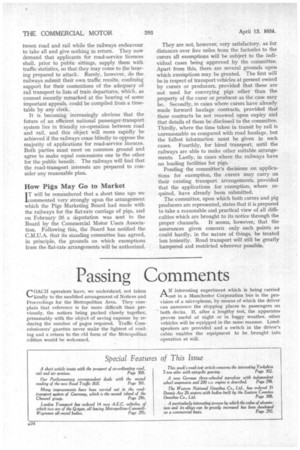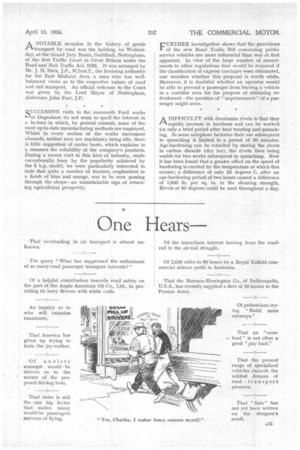Passing Comments
Page 26

Page 27

If you've noticed an error in this article please click here to report it so we can fix it.
COACH operators have, we understand, not taken kindly to the modified arrangement of Notices and Proceedings for the Metropolitan Area. They complain that reference is far more difficult than previously, the notices being packed closely together, presumably with the object of saving expense by reducing the number of pages required. Traffic Commissioners' gazettes never make the lightest of reading and a return to the old form of the Metropolitan edition would be welcomed. AN interesting experiment which is being carried out in a Manchester Corporation bus is the provision of a microphone, by means of which the driver can announce the stopping places to passengers on both decks. If, after a lengthy test, the apparatus proves useful at night or in foggy weather, other vehicles will be equipped in the same manner. Loudspeakers are provided and a switch in the driver's cabin enables the equipment to be brought into operation at will. A NOTABLE occasion in the history of goods
transport by road was the holding, on Wednesday, at the Grand Jury Room, Guildhall, Nottingham, of the first Traffic Court in Great Britain under the Road and Rail Traffic Act, 1933. It was arranged by Mr. J. H. Stirk, J.P., M.Inst.T., the licensing authority for the East Midland Area, a man who has wellbalanced views as to the respective values of road and rail transport. An official welcome to the Court was given by the Lord Mayor of Nottingham, Alderman John Farr, J.P.
SUCCESSIVE visits to the mammoth Ford works at Dagenham do not seem to quell the interest in a factory in which, by general consent, some of the most up-to-date manufacturing methods are employed. Whilst in every section of the works movement abounds, neither men nor machinery being idle, there is little suggestion of undue haste, which explains in a measure the reliability of the company's products. During a recent visit to this hive of industry, made exceptionally busy by the popularity achieved by the 8 h.p. model, we were particularly interested to note that quite a number of tractors, resplendent in a finish of blue and orange, was to be seen passing through the shops—an unmistakable sign of returning agricultural prosperity.
URTHER investigation shows that the provisions of the new Road Traffic Bill concerning public service vehicles are more influential than was at first apparent. In view of the large number of amendinents to other regulations that would be required if the classification of express carriages were eliminated, one wonders whether this proposal is worth while. Moreover, it is doubtful whether an operator would be able to prevent a passenger from leaving a vehicle in a corridor area for the purpose of obtaining refreshment—the question of " imprisonment " of a passenger might arise.
ADIFFICULTY with duralumin rivets is that they rapidly increase in hardness and can be worked for only a brief period after heat treating and quenching. In some aeroplane factories their use subsequent to quenching is limited to a period of 30 minutes. Age-hardening can be retarded by storing the rivets in carbon dioxide (dry ice), the rivets then being usable for two weeks subsequent to quenching. Now it has been found that a greater effect on the speed of hardening-is exerted by the temperature at which this occurs ; a difference of only 20 degrees C. after an age-hardening period of two hours caused a difference of 5,600 lb. per sq. in. in the shearing strength. Rivets at 80 degrees could be used throughout a day.


























































































